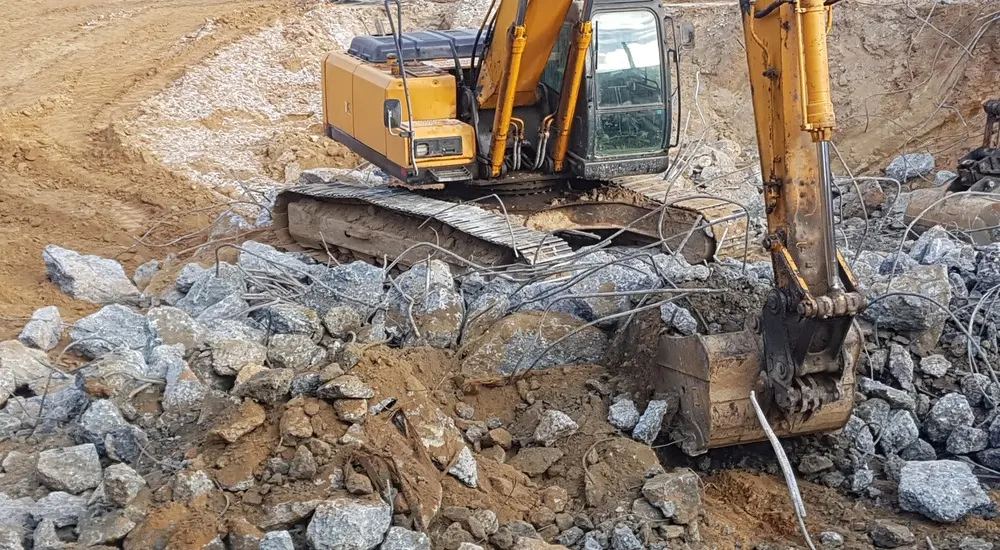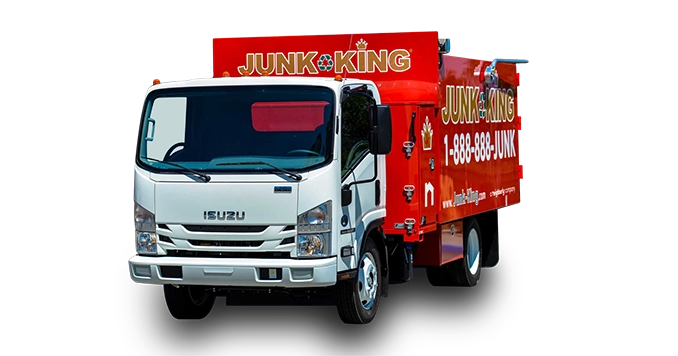[This article was originally published in July 2016. It has since been updated and revised.]
Contractors know that concrete debris removal is never an easy task. But finding an alternative solution can be. A jackhammer can break up old concrete, but what do you do with the debris?
In fact, one of the most difficult construction waste disposal projects is getting rid of concrete rubble and debris. But there is a better solution.
Concrete Debris Removal and Why It Is Problematic
Demolition and renovation often require a clean slate — including concrete removal from driveways, patios, parking lots, and structures. When you have to resurface the parking lot, replace pavement with grass, redesign the layout of a property, or redo a building’s foundation, big amounts of concrete waste are generated and needs to be removed.
Concrete disposal is difficult and even dangerous because it is heavy and unwieldy. Even transporting concrete debris can be a challenge. Unlike other construction waste materials, or C&D waste, concrete has both additional considerations for hauling and disposal, but it also provides additional opportunities for recycling.
And, while it is not normally classified as a hazardous waste material, the EPA rules defining those types of materials can be confusing, especially when it comes to concrete and masonry.
According to one article, the EPA “defines hazardous wastes in several ways, one of them being whether or not it is what is called a 'characteristic' hazardous waste. Does the waste meet certain stated characteristics?”
Based on standards established by the EPA, if a material has a pH greater than 12.5, like most cement, it is considered a corrosive material and, by definition, a hazardous waste material.
Simply put, disposal of concrete is not a simple thing.
Problems Experienced in Concrete Debris Removal
After the task of breaking up concrete, you may run into various problems while disposing of concrete. Scheduling a junk removal service will help you to avoid these pitfalls.
- Property damage - Be wary of piling concrete chunks on the sidewalk. The weight, sharp edges, and metal it most often contains, may damage the property or the property of neighbors, the city, or your HOA.
- Landfill costs - Take care of all the detail and unexpected costs with concrete removal and recycling from Junk King. When our teams of professional junk removers haul away your concrete waste you have no other out-of-pocket expenses such as landfill fees, fuel costs, and wear-and-tear to your trucks.
- Risk of injury - Always use proper lifting techniques and heavy-duty containers when you must transport concrete waste yourself. Also avoid leaving concrete where children might climb on it or throw the pieces.
Proper Disposal of Concrete Debris: Recycling or Dumping?
Regardless of which option you choose, the proper handling and disposal of concrete rubble always needs to be taken into consideration. That being said, pursuing other options besides using your local landfill can be beneficial.
According to Science Direct, it is difficult to give exact figures of construction waste produced on a typical construction site, but it is estimated that it is as much as 30 percent of the total weight of building materials delivered to a building site.
More recent figures are not readily available, but the EPA estimated that 600 million tons of C&D (construction and demolition) debris were generated in the United States in 2018, which is more than twice the amount of generated municipal solid waste (MSW) generated for that year.
And the EPA estimated that concrete and asphalt concrete made up 85 percent of all U.S. C&D waste in 2018. This means that in one year alone, more than 500 tons of waste concrete was somehow disposed of.
Fortunately, a great deal of the concrete debris that is not simply disposed of in landfills is re-purposed in a number of ways.
In fact, concrete recycling is an increasingly common method of utilizing the rubble. At one time, concrete was commonly trucked to landfills for disposal, but the benefits of recycling has made it a more attractive option, especially in light of more stringent environmental laws, and for keeping construction costs down.

3 Good Reasons Your Disposal of Concrete Should Include Recycling
It’s a good practice to keep any material out of the landfill, if possible, and the durability and potential for reuse of concrete debris makes it a great candidate for recycling. However, getting it off-site and hauled away is still a potentially costly and time-consuming proposition if you choose to do it yourself.
Three major reasons to recycle your waste concrete material:
1. Reduced costs of removing and hauling
It reduces the transportation costs for contractors and builders since concrete debris can often be recycled in areas near the demolition or construction site.
2. Elimination of high landfill fees
Recycling waste concrete instead of landfilling it saves builders disposal or tipping fees.
3. Contributes to the production of lower-cost recycled aggregate products
Not only does recycled concrete offer equal durability and strength in new concrete; it also has a much lower impact on the environment.
Generally, what is known as recycled concrete aggregate, or RCA, is used as granular fill, base, and sub-base material in construction, or as aggregate for new concrete pavement. By reusing old concrete pavement, builders minimize the amount of raw materials required for a new pavement structure.
Since aggregates make up between 70 to 85 percent of the concrete mixture by mass , it makes both economic and environmental sense to reuse as much of the existing pavement and debris as possible.
And the process for producing recycled concrete aggregates is simple and economical.
While RCA can be transported virtually anywhere, reusing the concrete at its original site - what is known as "in-place recycling" - has several benefits that can save on costs. By eliminating the costs of removing, hauling, and dumping old concrete, adding in the savings on disposal costs, and the potential cost of road damage from transporting virgin or waste materials, many states have seen estimated savings of up to 50 percent to 60 percent.
All from using recycled aggregates versus buying new aggregate.
As one waste management resource has noted,
Recycled concrete is 10-15% lighter than virgin aggregate, helping to increase project efficiency by reducing hauling and material costs. If concrete is uncontaminated with trash, wood or reinforcing materials, it can be recycled on site with mobile and portable crushers.
Keeping costs down is a priority for any project, but not if it means sacrificing structural quality. However, according to the Construction Materials Recycling Association, the high quality of recycled concrete allows it to meet state and federal specifications and it performs better in new concrete and asphalt products by providing better compaction and constructability compared to virgin aggregate.
Concrete Debris Removal Done For You
Junk removal services can take care of the heavy load and also direct the waste to concrete recycling facilities. Contractors (and homeowners) renovating a parking lot, driveway, sidewalk, patio, or other concrete related projects can now make it easy on themselves; just call Junk King to handle concrete removal the green way.
Landfills don’t want your concrete. Junk King recycles concrete and other construction debris to make the construction and renovation process greener for everybody.
We use a network of our own recycling facilities as well as other local recyclers to make concrete removal more environmentally friendly. Broken-down concrete gets pulverized into a material called recycled aggregate.
Aggregate gets crushed and sorted into various sizes. The material can be reused to pave roads and bind asphalt for construction projects — saving money and virgin resources. When you use Junk King's junk removal services for your concrete removal needs, you help to stop the overuse of landfills as well as making future construction more environmentally friendly!
Recycling Concrete Debris and Best Practices
Our team specializes in construction debris removal. We can be at your facility in mere minutes, so call us today!
Junk King provides an efficient, safe and eco-friendly construction waste disposal service so you don’t need to worry about the pick up or disposal of the debris after your project is complete. Whether you need our services several times during a construction project or just once after it is complete, our hauling professionals will ensure that the construction debris is out of your way so that you can get on with the job.
Our crew is fully insured and well-trained, so you can trust them to get rid of your unwanted items in a professional and courteous fashion. One of the best things about hiring Junk King is that we recycle a much of the material we pick-up. This is proof of our commitment to being an eco-friendly removal service.
Our professional and insured hauling team will call 15 to 30 minutes before we arrive on your site and we’ll give you a free estimate based on how much room your construction debris will take up in our truck. We haul the construction waste into our junk removal trucks and with no hidden fees.
So, how can you get us on your site for construction debris removal?
You can simply make an appointment by booking online above or give us a call.
